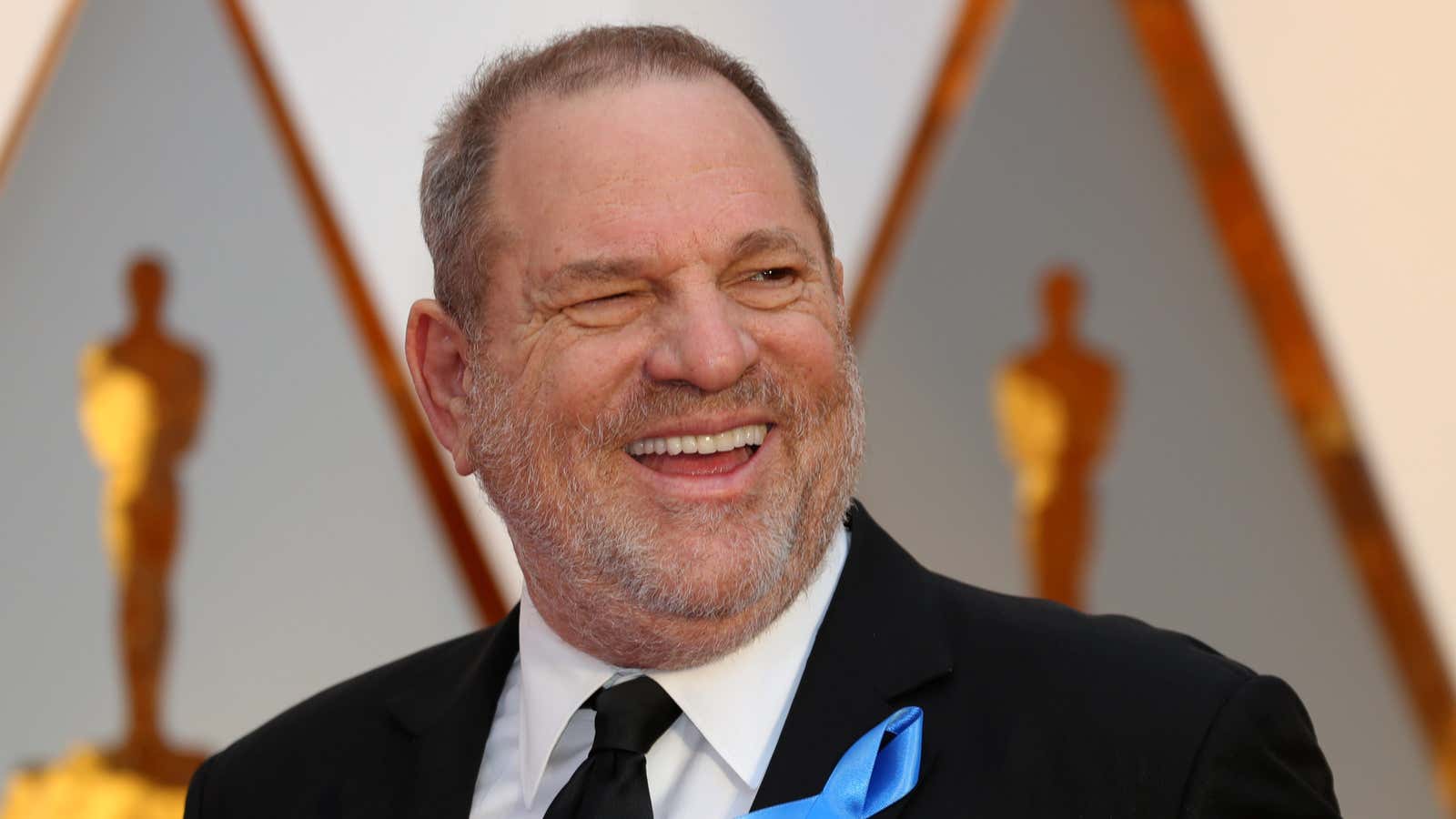Just over a week ago, Harvey Weinstein was one of Hollywood’s most powerful producers and a big Democratic Party donor. Then on Oct. 5 The New York Times reported that, over decades, he had paid off women who had accused him of sexual harassment. More and more women have come forward, accusing Weinstein of sexual misconduct ranging from forceful unwanted advances to rape.
Now Weinstein the movie mogul has been recast as a Hollywood villain, the accusations against him supporting the despicable stereotype of the producer who uses power and influence to obtain sexual favors. Further still, police—both in the US and in the UK—have made him the subject of investigation. His wife has left him and his own company has fired him.
As of Oct. 13, the count of women who have publicly accused Weinstein of sexual misconduct, including allegations of rape, is up to 32. They include the biggest of movie celebrities such as Angelina Jolie and Gwyneth Paltrow, a number of American and foreign actresses, employees and colleagues of Weinstein’s, models, and other women working in Hollywood jobs such as costume designer. The accumulation has been staggering, bringing to mind one of the most memorable magazine covers of recent years, which, in July 2015, presented 35 women who accused the American sitcom star Bill Cosby of sexual misconduct over a period of decades.
Years of whispers, then exposure
As with Cosby, many of the women had kept quiet about Weinstein out of fear that they would face retaliation or not be taken seriously—concern supported by the examples of those who had spoken up, such as model Ambra Battilana Gutierrez. She had gone to the New York police and seen her accusations against Weinstein dismissed without prosecution, despite pretty detailed audio evidence.
Then, as with Cosby, once the first few Weinstein accusers spoke up, a flood of others were emboldened to follow. Each of their stories reinforced and amplified the other, and social media worked as an echo chamber for them all.
Still, there is an important difference between these two sets of cases: When the Cosby women came forward, theirs was a spectacularly brave, largely unprecedented move. By the time the Weinstein story broke, the group accusation—used as a tactic against Bill Clinton during the 2016 presidential campaign of his wife—had become a pattern. Donald Trump, Roger Ailes, Bill O’Reilly, had all been the subject of multiple allegations, making the chorus too loud to be ignored.
Accusers find allies online as well as in real life: Women hearing their stories—and tweeting them, sharing them, writing about them—multiplied their reach, knowing from their own experience how common it is to be victim of sexual misbehavior, and how viscerally difficult it is to speak about it. Women knew to believe women, turning the sisterhood into a pack that could beat a predator.
This has become the blueprint for how to expose men seen as sexual predators in 2017.
Critical mass is vital
It does take a village—full of women standing by one another, confirming each other’s stories, each lending a bit of credibility that a woman alone may not be afforded. Without numbers, accusations can still be largely ignored. Think about Louis CK, who can dismiss the allegations of sexual misconduct without as much as a comment. Or Casey Affleck, who casually referred to the “noise” that accompanies fame during his Oscars acceptance speech—a noise also known as harassment accusations.
This need for a critical mass before accusations are taken seriously isn’t one to be celebrated per se. What is comforting—and indeed feels like a turning tide—is women finding a way to reach that critical mass more and more quickly, prompting swifter action. It took decades before even a single Cosby case moved from accusation to investigation to trial (albeit one that ended in a hung jury). But it only took a week for Weinstein to be ousted by his board—and find himself under investigation in two countries.
Next, it won’t take decades for the accusers to come forward, and then—hopefully in a future not too far away—it will be enough for one woman to speak up to be listened to, and believed. Let’s hope we have seen the last of the mass accusations, because addressing the first case stops a predator from creating more victims.
